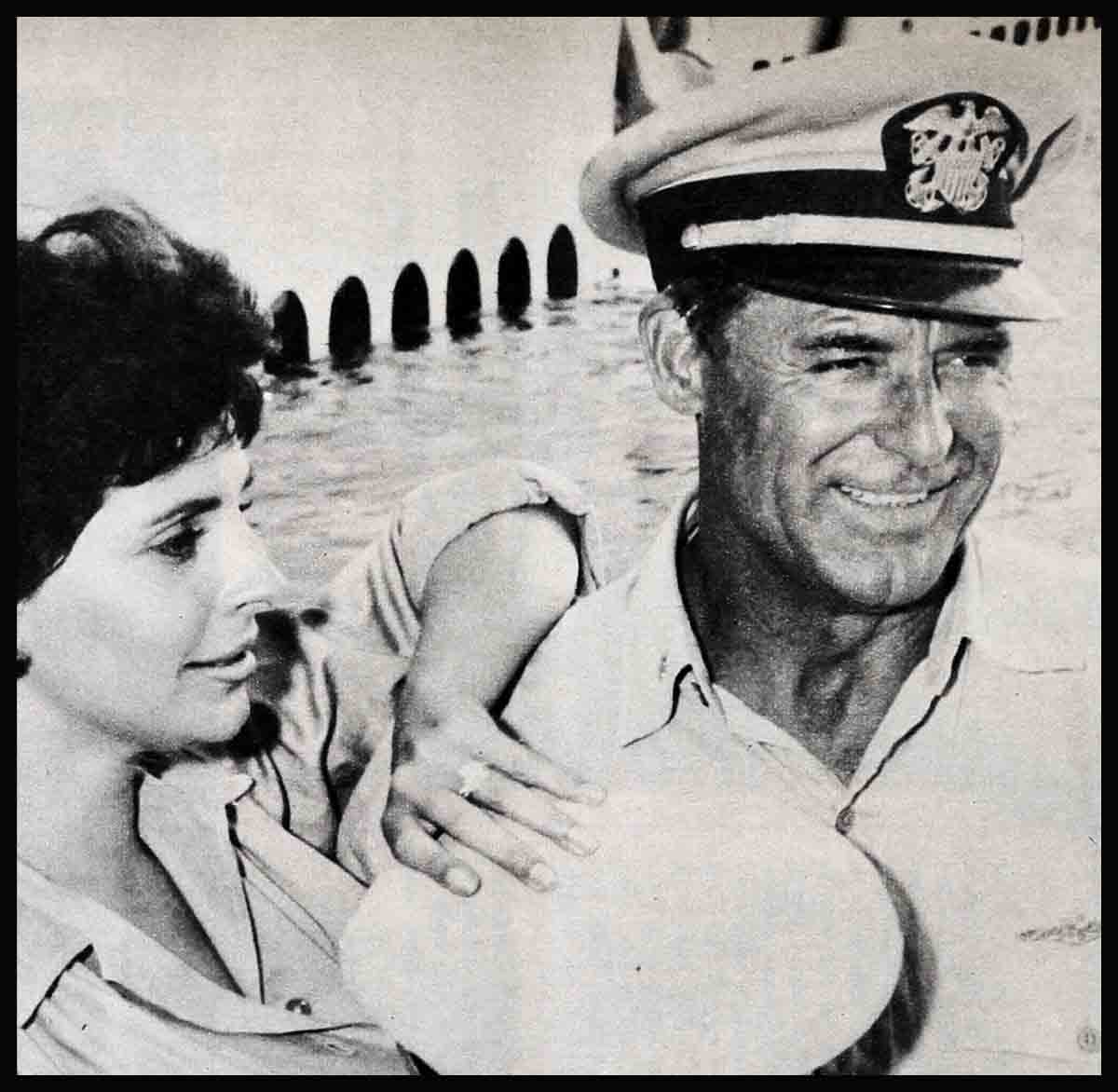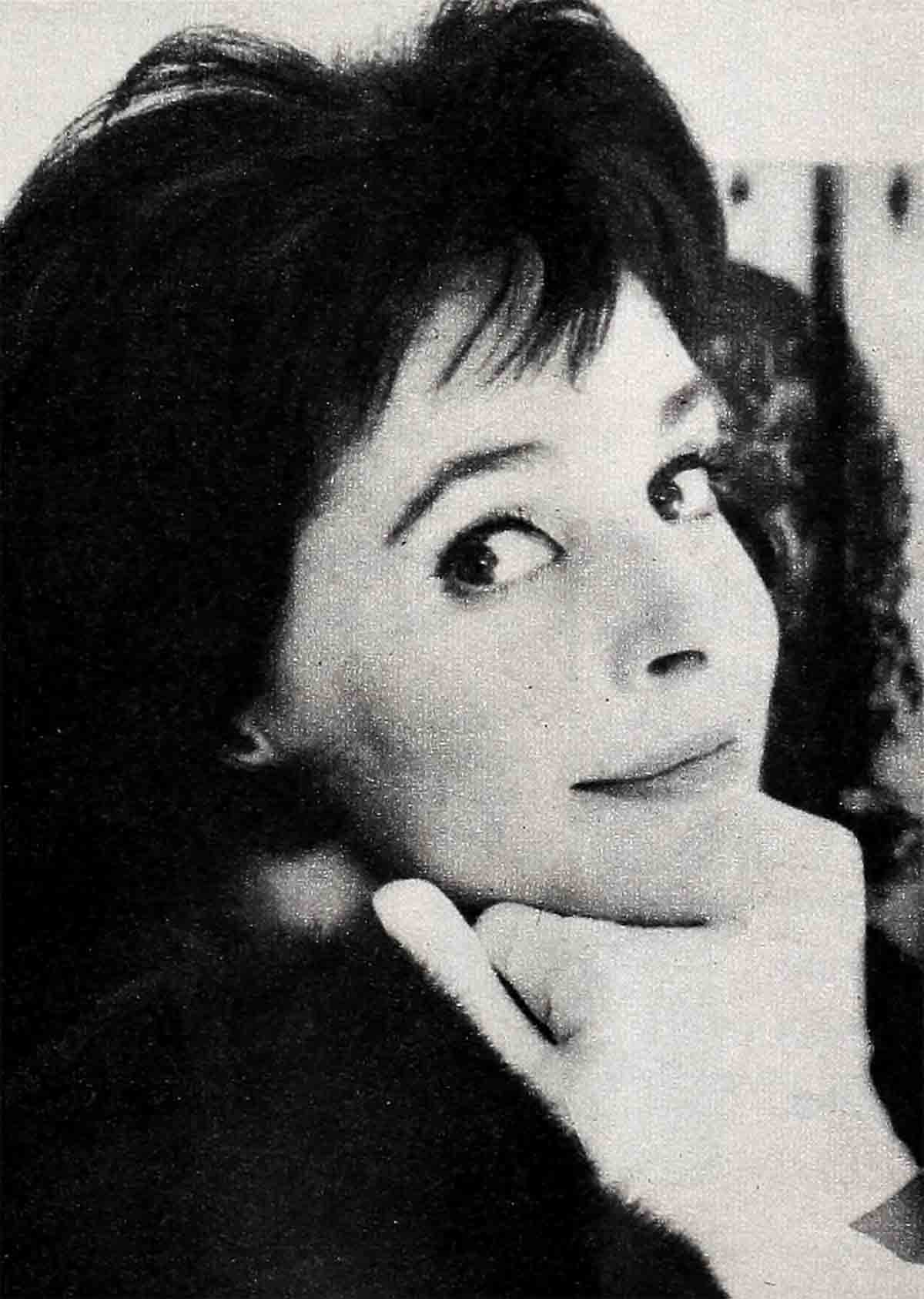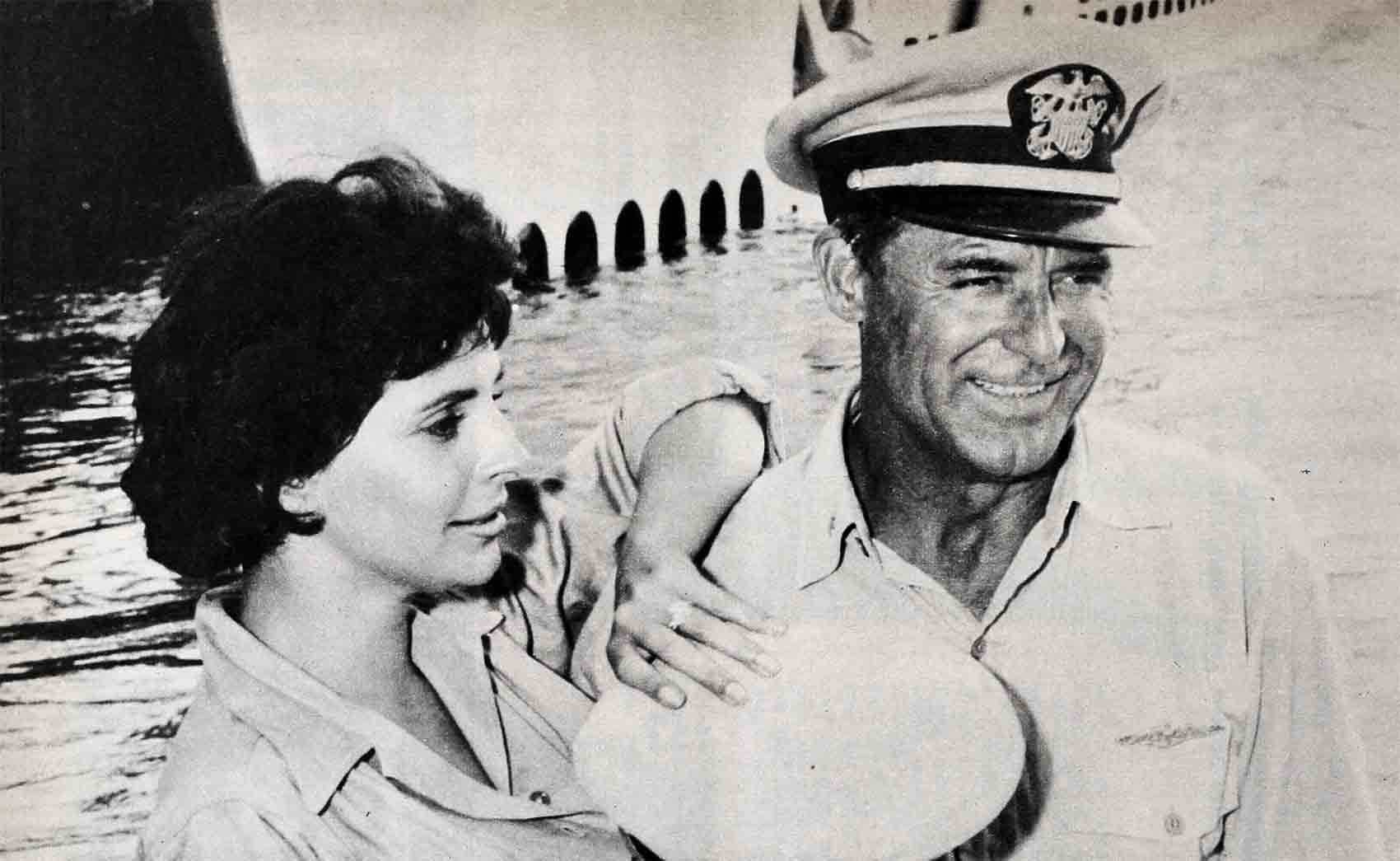
Madlyn Rhue: “Let Cary Grant Show You . . . As He Showed Me”
See the pictures on the other page? That’s me, Madlyn Rhue. You might have seen me in “Operation Petticoat,” that is, if you weren’t always looking at Cary Grant. But the top picture is the way I looked before I met Cary; the bottom is the way I looked after Cary taught me how to make the most of myself. What he showed me, because it helped me so much. I’d like to pass on to you. Cary says any girl can be more beautiful and I believe it because it happened to me and it can happen to you, also. Turn the page and I’ll tell you how it all began. . . .
I’d had a screen test. And now I was sitting in producer Bob Arthur’s outer office trying to look very poised and calm and not like a girl waiting to hear what happened. Do you know how it feels? You think of all the years you worked scrubbing ladies’ washrooms and working on lights and painted scenery just to get a chance to act. And the dozens and dozens of tryouts and the dozens and dozens of “we’re sorry’s.” I remembered them all as I sat there, pretending to read a magazine and pretending even more that even if the test didn’t turn out well, I’d have the courage to keep trying. I was pretending so hard, maybe that’s why, when the door finally did open and a tall, handsome man bounded out into the waiting room, I didn’t exactly faint. For the tall handsome man with the most magnificent voice was Cary Grant.
“Madlyn,” he said. “Have you seen your screen test?”
I hadn’t, but I didn’t know whether I should be happy or not.
“Well, it’s the most exciting test I’ve seen in ten years,” he said before I could answer.
When he said that, I dropped the magazine. I leaned over to pick it up and lost my balance so that I reared back and banged my head against his as he bent down to get the magazine for me. I was so embarrassed, but before I could apologize he said, “Come, stand up,” and since I couldn’t seem to do that either, he sort of grabbed me by the shoulders, pulled me up and turned me around to see how tall I was, talking easily all the time in that voice while I stood as though hypnotized.
He said he thought I could do the lead, that hadn’t been decided yet; and that I had all the qualities to be beautiful, and perhaps it would be well to have that little mole taken off my cheek and that if I didn’t mind would I take off my hat and be sure to bring some cool clothes with me for Florida and that it was going to be exciting to work with me and to relax. Then he pushed me gently back into the chair (where I was very glad to be) and before I knew it, he was gone.
That was the beginning. I learned later from him how to be a hostess; how to dress; the art of makeup; what poise is; how to laugh and the art of living. I didn’t get the lead in the picture, my part actually turned out to be a very small one, but I got something far better, as you can see.
Cary Grant is a sensitive man; a man with quiet ways; a man so aware of people that he can sense when anyone is upset and make them relax. By watching him, I learned something very important. And that is, to be attractive and charming, you must forget yourself as he does and give your interest and your complete thought to the other person. You cannot fail to “connect” with other people if you do this. He enjoys teaching people to live more fully, to look better and to feel better. Like being thoughtful. Cary always remembers little things.
When we first arrived in Florida, we were all a little apprehensive. Cary came around to all of us girls and greeted each of us personally. When he finished, he came over to me, and quietly, squatting down on his knees beside my chair, he said, “You didn’t have the little mole on your cheek removed.” He not only remembered who I was, but he remembered the advice he’d given me and, what’s more, he made me feel that it really mattered to him—that I should look better.
He began teaching me poise. How? He made me feel I had poise. “And as much class as anyone would want, Madlyn. (You have to have faith in yourself.) You can hide class only by doing what you think is classy,” he said. I thought about this a long while. And now I know what he meant. I had always thought I was a lady but, especially in show business, I wanted other people to know it. I tried to be cool, elegant, ladylike and proper. But what I did was dress too severely for my age. And I tried to minimize sex. I worried myself sick that my figure was too sexy and so I wore bulky shirts and sweaters and high necks. And, of course, I always wore white gloves!
There’s a difference, Cary taught me, between being proper and being false. The trick is to relax and enjoy what you’re doing and not worry about which fork goes where or whether you have on white gloves. That made me remember the first time I had met Cary. He’d had on levis, tennis shoes and a magnificent tweed sports jacket latched together at the top with a safety pin—a big safety pin! Like an absent-minded professor. Yet he looked elegant.

I worried myself sick that my figure was too sexy and so I wore bulky shirts like the one in this photograph and high necks. When I got dressed up. I’d dress too severely for my age—you know, plain black sheath dresses. Cary told me, “ That dark eye makeup makes you look older and it makes your eyes recede. Experiment with make-up, see yourself.” I discovered the effect should be natural-looking. In the film I wore a lighter lipstick, and I liked it better than my dark shade so I wear it all the time now.
We were dripping wet
“Learn how to have dignity,” he said, “and you will always look proper.” One day, when we were dancing around the swimming pool at the hotel, Cary pushed someone into the water as a joke. A few minutes later, someone pushed Cary in. He laughed, splashed about, climbed out and continued our dance which, in two seconds, meant I was dripping wet, too. Then, in a very dignified manner, he escorted me to the hotel dining room for lunch, both of us dripping wet.
As we sat down, she said, “And do you realize, Madlyn, you look exactly like a lady? Clothes don’t make the difference—or white gloves.” This is the true meaning of sophistication. When you can enjoy everything in life as if for the first time—that’s true sophistication. That’s what Cary is able to do. And he applies it to work, too. He is aware of the full meaning of each scene.
“Look into the camera before your scene,” he said. “See where your stand-in is in the camera image, because that’s where you’ll be when it comes time to shoot. Is she in focus? Is this going to be a close-up?” He had the cameraman take two shots, one shot with me just walking in the way I’d been doing. For the next shot he had me check my position first by looking through the camera. On the first shot, I was entirely out of focus. I learned to check and stand in focus.
“Keep quiet for close-ups,” he said. “Let your eyes and mouth do it for you.” (This is true in real life, too. A girl shouldn’t move too much.)
But what I’m trying to say, from what Cary taught me, is that if you do something, do it right. Know all about the work, or the reason for the course in school, or how you can enjoy the party—not fear it. Try to live fully by thinking and understanding what you want and are doing.
I learned so many things from him. Like the afternoon on the dock when we were all waiting and the crew was setting up a shot. A mob of extras and a mob of spectators were standing about, too, and suddenly Cary asked, “May I have this dance?” And away we went, over the knotholes, Cary whistling and gay. At that moment, the director called “action” and Cary stepped out of the dance and into the scene where he had to be angry—without a minute’s pause. When I asked him later how he could do that, he assured me that so could I do it. “Learn to give your attention to more than one thing, more than one person at a time, don’t allow yourself to be narrow-minded.”
He taught me, not by criticizing, but by admiring—and this is a wonderful way that anyone of us can help another person. Once I was so tired that for a couple of days I came down to the set in slacks. The third day I dressed in a white silk shirtmaker dress, white sweater, high-heeled white shoes and matching gloves and bag. “That’s the way you should dress. You look beautiful,” he said, and took me out to lunch. I’ve never gone to the studio again in slacks.

Incidentally, this is a retouched photograph of me. I now keep my eyebrows natural, wear a light lipstick, and one line on my eyes—that’s all. I wear my hair long but short on top so when it’s curled it gives me height—which l need. Cary says a woman should strive to make herself look soft and feminine. He felt my old look was “hard.” I now minimize my lips by not making them so full when I apply lipstick and to get a neat line I use a lipstick brush and always blot my lips carefully. My aim: to always look alive and natural.
“I am odd”
It used to make me very nervous to enter a room because it seemed to me that everyone turned to look at me. “Because I’m odd,” I used to think. “Because I’m funny.” But Cary Grant assured me I was neither. “You are a beautiful girl and you must think of yourself in those terms, as a lovely, gracious person.” He taught me what every girl can learn, to check up on each important point before entering a room. Is your makeup natural? Does your costume complement you? Everything matching, nothing bright so that there is no conflict with the drama that is you? “You never want to lose this sense of the dramatic, but it must still be subtle.” That’s what Cary kept saying. I learned to pause outside a room and give everyone a chance to look at me if they wanted to. Then walk in as tall as possible. I’m not quite five-foot-four, but I try to look five-seven.
Mother had taught me to listen, but Cary Grant showed me what listening meant. He listened to me. He made me conscious of my voice, of the range a voice can have, how pitch can make up for humor or pathos, he made me sing up a storm to keep the range of it. But he also listened to what I had to say. He made me aware of “everything within me.” Not of the sun or the wind or the beauty all around, because I am aware of them anyway, but of the things inside me. I had a feeling of insecurity, and if I made a remark and someone asked, “What did you say?” I was likely to answer, “Oh, it doesn’t matter.” Cary taught me that I was entitled to my own opinion, that he valued it, that what I had to say was interesting and provocative. He gave me faith in myself.
“You are a sub-tender,” he said (a sub-tender maneuvers the submarine into dock). “A sub-tender of people.” And he understands this because he’s a subtender himself. Some people don’t understand this, they feel that being open and warm you leave yourself wide-open to be stepped on. But I’ve always thought that if you open yourself to a hundred people and get one return, you’re batting a thousand. Mark Damon, whom I date, worries about me, so does Bob Vaughn. They think I’m gullible because I believe everything people tell me, but Cary understands it, having a sympathy and sadness for people, too. One of the things he told me that he liked best in my screen test was that I listened to what the other girl said. He didn’t worry about me, but he did point out some of the hazards. I am inclined to worry about too many people and their problems, being a girl to whom people talk to. He couldn’t stop me from listening, but he taught me to sympathize and then try to forget—because I am not equipped to cope with all these various problems. He taught me to worry only about my own—and only those of today. He said, “Madlyn, half the time those future problems will never happen, so you’ve wasted all that worry.”

He’s never stopped learning
He taught me that you learn from everything, the happy things and the unhappy things. He’s never stopped learning from mistakes, and things, and people. Now I try to apply that. When I’m traveling or spending a weekend perhaps at Palm Springs, and meeting people around a pool, I never say I’m an actress; I say I’m a secretary in an insurance office. If I say actress, they want to know all about that, and I don’t have a chance to hear about them. It’s very easy to get people to express themselves if you can find out what their work is, or if they have children, or what their hobbies are. I like to meet all kinds of people. I’m interested in them. Cary taught me how to show that interest graciously—by always asking the names of the people to whose house we were going, the names of the others who’d be there, and what they all did, so when we met I’d have a basis for conversation. Now, when I introduce people, I always tell who they are and what they do. It makes the talk easier.
And I’ve learned from him the trick of mixing my guests at my own parties. If I invite only show people they’ll talk shop, but if I throw in a few young attorneys, a psychiatrist, a cameraman and a scientist, let’s say, we’ll have fascinating talk. And I can relax and enjoy it, because I prepare the refreshments in advance, for if you’re not relaxed, how can your guests be?
I have acquired a few good tips on relaxing when I do get nervous and feel a tension in the back of my neck that’s bound to give me a headache unless I ward it off. This is something anyone can do. If I’m with people and feel the tension coming on, I excuse myself and go into another room. (You can always go into the bathroom.) I slowly rotate my head, and then I bend forward and let my head hang until I feel the blood rush in. It’s a great help.
If I’m home when I get that tight, taut feeling as if someone’s grabbing me by the back of the neck, I lie across the bed, letting the tips of my shoulders and head hang over the edge till the blood circulates. Then I sit on the floor, cross-legged, with my back very straight, let my arms drop limply, then bring first one shoulder up to my ear, then the other, four times and rotate.
But I do think that most tension comes from nerves or unhappiness, and can be overcome by thinking things out.
And as you see, Cary Grant has given me a great deal to think about. It all adds up to an image of graciousness that each of us must develop for himself. To Cary, Ingrid Bergman and Princess Grace have it—personalities that are wise, warm and intelligent. He also pointed out to me that the world too often mistakes cool aloofness for charm. “It just isn’t so, Madlyn,” he said. “There is nothing so gracious as warmth combined with class and an interesting mentality—which does not have to mean bookishness. All delightful human beings have a natural curiosity and are interested in the world around them. They have stimulating things to say, they want to hear what you have to say, and they give people the feeling of being wanted.”
When we left Florida at the end of location, I left with self-confidence, hope and a sense of “becoming.” I wanted to become a fine woman, a good wife and mother, and a fine actress, too. And for the first time in my life I know that I can, that the potential is there. Because if someone you admire and respect, admires and respects you, you begin to feel a new confidence, a new faith in yourself. And once you have that feeling, you’ll find you’ll never get lost again.
—MADLYN RHUE as told to JANE ARDMORE
SEE CARY IN U.I.’S “THE GRASS IS GREENER.”
It is a quote. PHOTOPLAY MAGAZINE OCTOBER 1960




